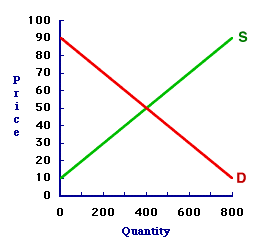
|
|
X: The standard abbreviation for exports produced by the foreign sector and purchased by the domestic economy, especially when used in the study of macroeconomics. This abbreviation is most often seen in the aggregate expenditure equation, AE = C + I + G + (X - M), where C, I, G, and (X - M) represent expenditures by the four macroeconomic sectors, household, business, government, and foreign. The United States, for example, sells a lot of the stuff produced within our boundaries to other countries, including wheat, beef, cars, furniture, and, well, almost every variety of product you care to name.
Visit the GLOSS*arama
|
|


|

|
                           MARKET DISEQUILIBRIUM: The state of the market that exists when the opposing market forces of demand and supply do achieve a balance and there is an inherent tendency for change. Market disequilibrium results if the market is not in equilibrium. More specifically, market disequilibrium results if the demand price is not equal to the supply price and the quantity demanded is not equal to the quantity supplied. In general, disequilibrium results if opposing forces are not in balance. For market disequilibrium, the opposing forces that are out of balance are demand and supply. The result of the imbalance between these two forces is the existence of a shortage or surplus, which induces a change in the price.Shortage and SurplusMarket disequilibrium is characterized by either a surplus or a shortage. Both arise due to the inequality between quantity demanded and quantity supplied.- Shortage: A shortage exists if the quantity demanded exceeds the quantity supplied at the current market price. This condition emerges if the market price is below the equilibrium price. With a market shortage, buyers are unable to buy as much of the good as they would like at the current price. As such, they are motivated to raise the price.
- Surplus: A surplus exists if the quantity supplied exceeds the quantity demanded at the current market price. This condition emerges if the market price is above the equilibrium price. With a market surplus, sellers are unable to sell as much of the good as they would like at the current price. As such, they are motivated to lower the price.
Market disequilibrium exists with a surplus or shortage because the price does not remain unchanged. The imbalance between quantity demanded and quantity supplied prompts the price to change. A shortage prompts the price to rise and a surplus causes the price to fall.Out of Balance| The 8-Track Tape Market |  |
Market disequilibrium can be illustrated using the market for 8-track tapes displayed in this exhibit. This graph was generated after long hours attending the 88th Annual Trackmania 8-Track Tape Collectors Convention at the Shady Valley Exposition Center.- Shortage: Consider first how a shortage is created at a 30 cent price. Click the [Shortage] button to highlight this price. At 30 cents, the quantity demanded is 600 tapes and the quantity supplied is 200 tapes. This is not equilibrium. The buyers cannot buy all that they want. They want to buy 600 tapes, but only 200 tapes are offered for sale by the sellers. This shortage motivates buyers to offer a higher price. This shortage is clearly NOT equilibrium.
- Surplus: Now consider how a surplus is created at a 70 cent price. Click the [Surplus] button to highlight this price. At 70 cents, the quantity demanded is 200 tapes and the quantity supplied is 600 tapes. This is not equilibrium. The sellers cannot sell all that they want. They want to sell 600 tapes, but only 200 tapes are being purchased by the buyers. This surplus motivates sellers to charge a lower price. This shortage is clearly NOT equilibrium.
For sake of completeness and for purposes of comparison, the equilibrium condition in the market can be identified by clicking the [Balance] button. Doing so reveals an equilibrium price of 50 cents and an equilibrium quantity (without shortage or surplus) of 400 tapes.

Recommended Citation:MARKET DISEQUILIBRIUM, AmosWEB Encyclonomic WEB*pedia, http://www.AmosWEB.com, AmosWEB LLC, 2000-2024. [Accessed: October 21, 2024].
Check Out These Related Terms... | | | | | | | | | | | |
Or For A Little Background... | | | | | | | | | | | | | |
And For Further Study... | | | | | | | | | | | | | |
Search Again?
Back to the WEB*pedia
|



|

|
BLUE PLACIDOLA
[What's This?]
Today, you are likely to spend a great deal of time waiting for visits from door-to-door solicitors trying to buy either a wall poster commemorating last Friday (you know why) or a country wreathe. Be on the lookout for strangers with large satchels of used undergarments.
Your Complete Scope
This isn't me! What am I?
|

|
|
Potato chips were invented in 1853 by a irritated chef repeatedly seeking to appease the hard to please Cornelius Vanderbilt who demanded french fried potatoes that were thinner and crisper than normal.
|

|
|
"A stumble may prevent a fall. " -- Margaret Thatcher, British prime minister
|

|
CD
Certificate of Deposit
|

|
|
Tell us what you think about AmosWEB. Like what you see? Have suggestions for improvements? Let us know. Click the User Feedback link.
User Feedback
|


|


